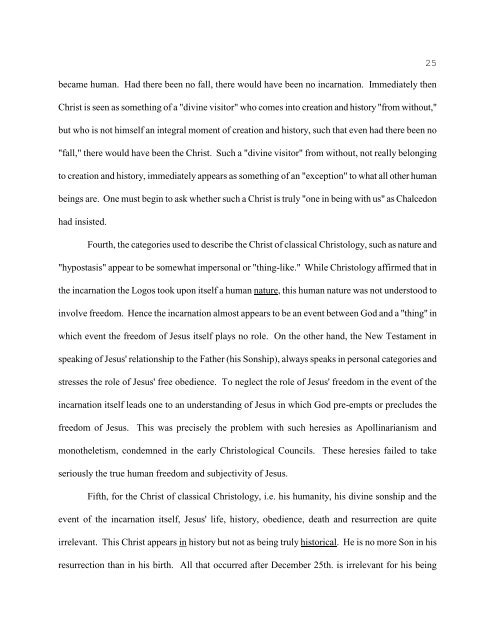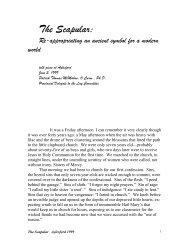Christocentrism of Charism – Buggert - CarmelStream
Christocentrism of Charism – Buggert - CarmelStream
Christocentrism of Charism – Buggert - CarmelStream
You also want an ePaper? Increase the reach of your titles
YUMPU automatically turns print PDFs into web optimized ePapers that Google loves.
ecame human. Had there been no fall, there would have been no incarnation. Immediately then<br />
Christ is seen as something <strong>of</strong> a "divine visitor" who comes into creation and history "from without,"<br />
but who is not himself an integral moment <strong>of</strong> creation and history, such that even had there been no<br />
"fall," there would have been the Christ. Such a "divine visitor" from without, not really belonging<br />
to creation and history, immediately appears as something <strong>of</strong> an "exception" to what all other human<br />
beings are. One must begin to ask whether such a Christ is truly "one in being with us" as Chalcedon<br />
had insisted.<br />
Fourth, the categories used to describe the Christ <strong>of</strong> classical Christology, such as nature and<br />
"hypostasis" appear to be somewhat impersonal or "thing-like." While Christology affirmed that in<br />
the incarnation the Logos took upon itself a human nature, this human nature was not understood to<br />
involve freedom. Hence the incarnation almost appears to be an event between God and a "thing" in<br />
which event the freedom <strong>of</strong> Jesus itself plays no role. On the other hand, the New Testament in<br />
speaking <strong>of</strong> Jesus' relationship to the Father (his Sonship), always speaks in personal categories and<br />
stresses the role <strong>of</strong> Jesus' free obedience. To neglect the role <strong>of</strong> Jesus' freedom in the event <strong>of</strong> the<br />
incarnation itself leads one to an understanding <strong>of</strong> Jesus in which God pre-empts or precludes the<br />
freedom <strong>of</strong> Jesus. This was precisely the problem with such heresies as Apollinarianism and<br />
monotheletism, condemned in the early Christological Councils. These heresies failed to take<br />
seriously the true human freedom and subjectivity <strong>of</strong> Jesus.<br />
Fifth, for the Christ <strong>of</strong> classical Christology, i.e. his humanity, his divine sonship and the<br />
event <strong>of</strong> the incarnation itself, Jesus' life, history, obedience, death and resurrection are quite<br />
irrelevant. This Christ appears in history but not as being truly historical. He is no more Son in his<br />
resurrection than in his birth. All that occurred after December 25th. is irrelevant for his being<br />
25



